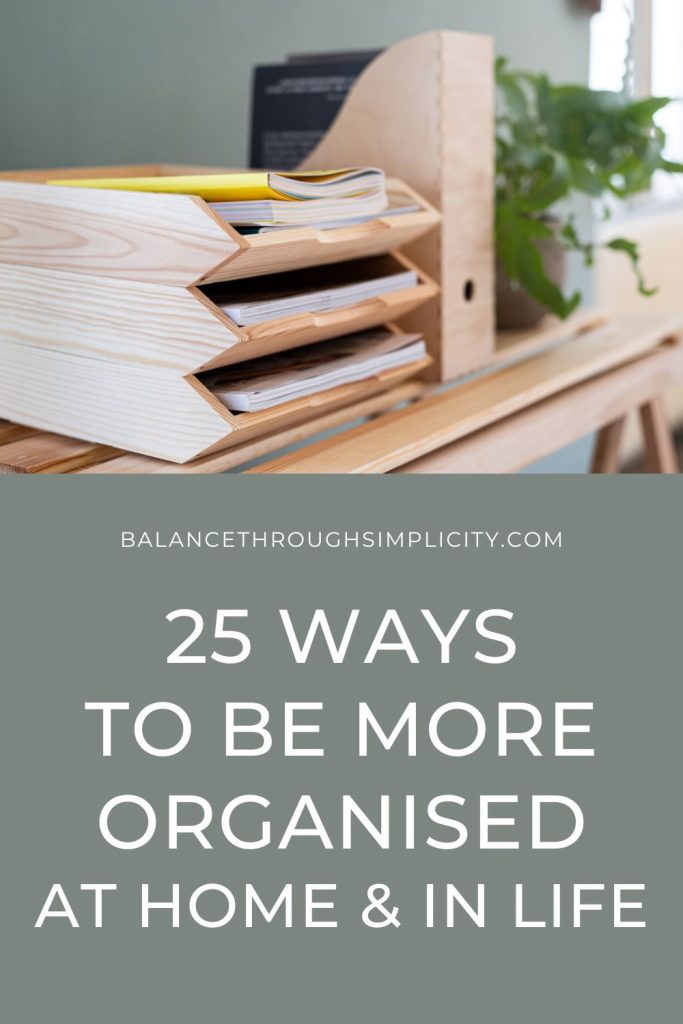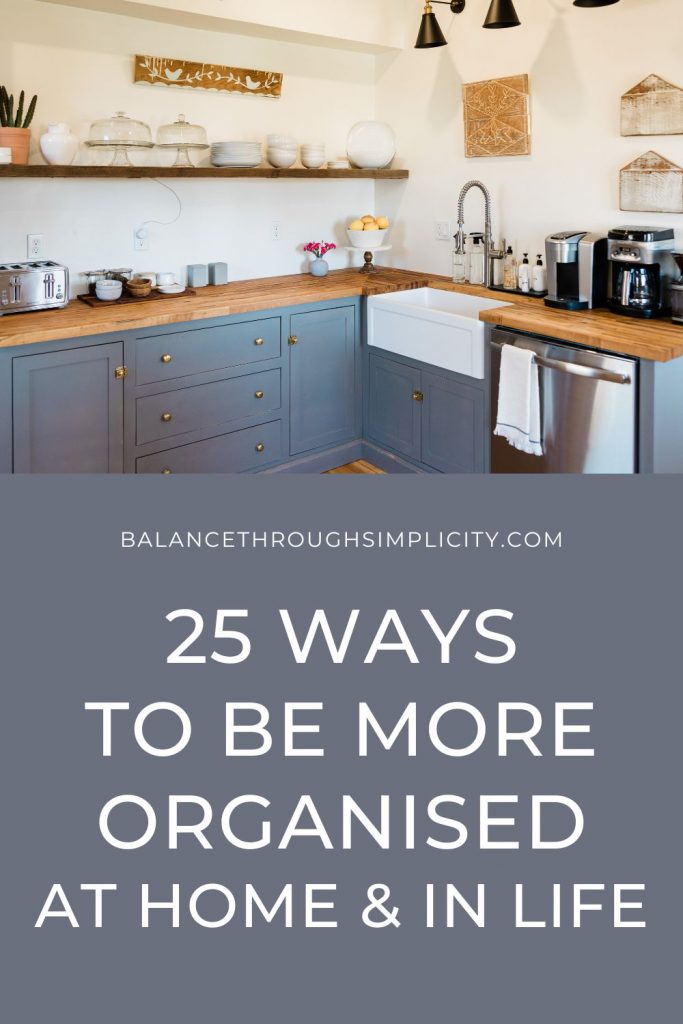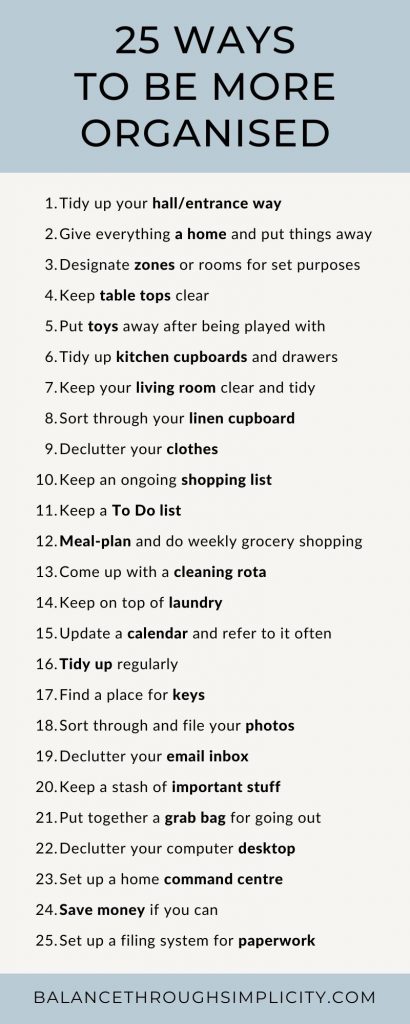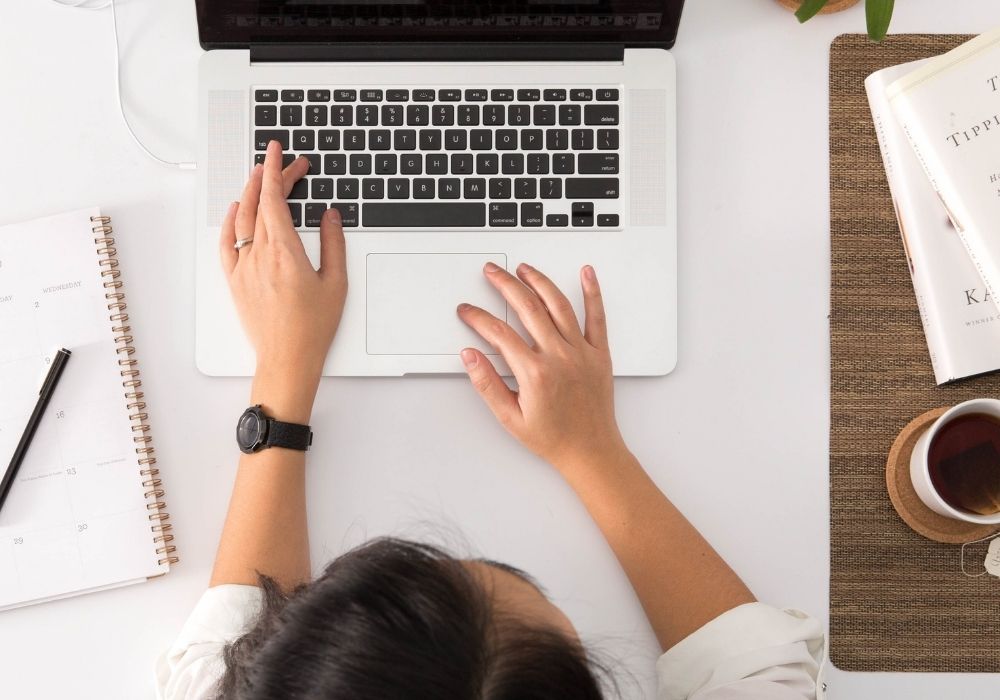25 WAYS TO BE MORE ORGANISED AT HOME AND IN LIFE
Good time management is a great way of supporting a simple and intentional lifestyle. Check out this post for 25 ways to be more organised in your home and life to help you maximise your time and what you do with it.
BEING ORGANISED AT HOME AND LIFE
I write about simplifying and decluttering life so you can be intentional in how you use your space, energy, time and freedom. Out of all these precious resources, your time is arguably one of your most limited resources. Once it’s gone, it’s gone.
Being organised, whether it’s at home, at work or your life in general, can help you make the most of that precious time. This is why I love to share tips on time management and productivity alongside articles on simple and intentional living. Being organised is a wonderful way of maximising the time you have so you can be freed up for other things in life.
REASONS TO BE MORE ORGANISED
Although sometimes we have to be flexible and just ‘wing it, I do think it’s helpful to be organised – especially if you’re tight on time, space, money and/or energy!
Here are some great reasons to be more organised…
- Less likely that you’ll lose something because you’ll know where most, if not everything, is
- Easier to find things because everything has a proper place to live or be stored
- Creates more space because you only have what you need and love and there’s less random clutter taking up your physical space
- Increases productivity because you don’t waste time wondering what to do or where things are
- Makes you more efficient because you know what you’ve got to do and when
- Cuts down the stress because things are easier and simpler when you’re more organised
- Eliminates the frustration of not getting things done that you need to
- Creates more time and freedom which you can choose to spend in whatever way you want
- Saves money as you’re not buying stuff unnecessarily because you can’t find it or forgot you had it already!
- Makes for a calmer family and home because YOU are generally calmer, less overwhelmed and on top of things!
- Avoids problems such as last-minute trips to the shops, double-booking, running out of time and forgotten appointments because you’ve planned ahead and pre-empted the problem before it becomes a problem
If all of these sound good, then you might like these quick tips to help organise various aspects of your home and life. Read on for 25 ways to be more organised!

25 WAYS TO BE MORE ORGANISED
Here’s a list of 25 ways to be more organised for your home, in your schedule and routines, with your storage and filing and your life in general!
1. Your hall/entrance way
Your entrance way is likely to be a clutter hotspot. Shoes, coats, bags, hats, scarves, footballs, incoming post, keys, letters from the school… all these things tend to get dumped in the hallway as you come in and out of the front door, unless you can find a more organised and suitable home for them. Think about how your hallway is used and the sorts of stuff that accumulates there. Do you need boxes for shoes, hooks for coats, shelving or cupboards for bags, a bowl or hooks for keys? Find a way of using the space available and giving everything a home. Teach your family to put and keep everything in its place and keep encouraging them if this doesn’t work right away!
2. Give everything a home
Make sure everyone in your home knows where things belong and ensure that all the stuff is returned to its proper home once everyone has finished using or playing with it. Little kids will need help and encouragement whilst you teach them how to tidy away, but even a toy box in the corner of your living room will help them learn to put their toys away until next time. Giving everything its own ‘home’ or storage space is a great way of preventing your home from looking cluttered and you can keep that clutter creep in check. When you notice clutter building up and not being put away, maybe you have too much clutter?!
3. Designate zones or rooms for particular purposes
If you work from home or use the computer a lot, set yourself up with a home office (either a separate room or corner of another room) so this is where you go to use the computer. Encourage your kids to play in their bedrooms, or the playroom, or just in one room at a time, rather than spreading themselves and their toys throughout every room in the house! Use each room for the purpose you intend it and set that room up so that you can use it in that way. Make sure you’ve got the necessary equipment, storage and space for whatever you’re using that room or area for. This will stop you endlessly moving toys etc back into the place they should be, make it quicker to tidy up afterwards and easier for everyone to find what they need and use the space as it’s intended.
4. Table tops
Clear the stuff from all your table tops and surfaces. Dust them down, keep them clear and only put back items that you love, need or want to look at. Flat surfaces are notorious dumping grounds for so many things, from important post to random junk. Letting stuff pile up will lead to chaos, confusion and, at the very least, you won’t be able to find what you’re looking for!
5. Toys
Ask your children (if they’re old enough) to go through their toys and make piles of the ones they play with all the time, the ones they play with sometimes and the ones they never play with. Explain that there are children who don’t have so many toys and encourage your kids to donate the toys they never use to them. Group the different types of toys together and find storage solutions that work for your family. Make them at child-friendly height if you’re ok with your kids being able to access them/put them away by themselves or pop them out of reach if you need to be there when they want to play with them. Here are some tips on how to declutter toys and why your kids might benefit from fewer toys.
6. Kitchen cupboards and drawers
Go through your kitchen and pull out all the utensils, pots, bowls, mugs, glasses, cutlery etc that you don’t use. Either donate or throw them away. If you’re not sure whether you’ll need something, put it in a box in the garage for 2 weeks and if it’s not used after that time, then donate/throw it. Clean the cupboards and drawers and put everything back in an organised and tidy way. You should have a bit more space now to do this because you’ve got less stuff! You’ll also know where everything is for the next time you want to use it. You’ll know what’s in your food cupboard and when you need to re-stock.
7. The living room
Look at your living room, is it full of things that don’t belong in the room but have ended up there because it’s where your family spend a lot of time? Do you need a basket or toy box which can stay in the room so that the toys can be thrown in there at the end of the day? You won’t have to spend time collecting them all up and returning them to your child’s bedroom each evening! Is your living room a reflection of you – warm and cosy, light and airy, in a colour and decor style you like, or are the table tops cluttered with stuff, drawers overflowing? Sort through them! A cluttered living room might not help you feel your home is the sanctuary you need it to be from the busy, chaotic world outside.
8. Linen cupboard
Take everything out and sort into piles. Bath towels, hand towels, pillow cases, sheets and duvet covers for your bed, for the children’s room and any guests that might stay. Be ruthless with items that are threadbare or have holes. Put back into the cupboard only enough of each item that you’ll think you need depending on the size of your household. Put complete sets of bedding etc together by folding them up in one bundle or putting the sheet and duvet cover into the matching pillowcase. This makes it much easier when it comes to pulling out what you need to change the beds. Keeping up with a regular laundry routine will usually mean you need less towels, sheets etc. You can always keep a few sheets/towels back for the dog or as rags if you would like.
9. Your wardrobe
Another way to get organised is with your closet. Take everything out of your wardrobe. Find another home for everything that shouldn’t be there, a wardrobe is for clothes only! Clean the inside thoroughly. Sort your clothes into 3 piles (keep, donate, throw away). Only put back into your wardrobe the items you want to keep. These should be pieces that are in good condition, that you love and enjoy wearing regularly and make you feel good when you put them on. Take the donate and throw away piles straight to a charity shop or the bin. Creating a minimalist capsule wardrobe isn’t just a way of saving you time and making it easier and quicker to get dressed each morning. A capsule wardrobe is good for the environment too!

10. Keep an ongoing shopping list
Don’t rely on your memory. When you know you’re running low on something add it to your shopping list. You could keep this on your phone or on a piece of paper stuck on the front of the fridge.
11. Keep a To Do List
You can prioritise the important things. It will help keep you focused on what you’ve got to do, make sure you don’t forget anything and free up your mental space by getting your thoughts out of your mind and down on paper. You can also tick things off the list as you do them, so you can feel really productive and visually track your progress!
12. Meal-planning and grocery shopping
Every weekend I do a plan of the meals that our family will need for that coming week. I look at who’s going to be around for which meals, including breakfast, lunch, dinner and any snacks. Then I do my online grocery shop for the food to be delivered to my door every Monday. I’ve set an alert on my phone to remind me every Sunday evening to place the order in case I forget. This way my fridge and cupboards never run completely empty, I can calculate how much milk, bread and other stuff I need for the week and I don’t have to dream up nutritious, exciting meals that suit all the family when I have no ingredients and only ten minutes to get it on the table. At the end of the day when I’ve been on the go and making decisions all day, I really don’t feel like cooking and would rather reach for the takeaway menu or frozen chicken nuggets. Nothing wrong with nuggets but perhaps not seven days a week! Meal planning not only saves time and stress in the kitchen, but it also helps me eat more healthily.
13. Come up with a cleaning rota
I’ve worked out how many rooms are in my home, what needs to be cleaned in each of them and how often and I’ve made a rota to ensure each bit is cleaned as often as is necessary – daily, weekly, monthly, 6-monthly etc. Here are some tips on how to spend less time cleaning.
14. Laundry
Work out how often you need to do a load of laundry and get into a routine of doing this as regularly as your household requires. I tend to put a wash on every couple of days. This way everyone has a fresh supply of clean clothes and the dirty laundry doesn’t build up. Here are some other household routines you could try to minimise time and be more organised around the home.
15. Keep a calendar
Either a paper one that you can refer to and update easily, or even better, use an electronic calendar on your phone. Make a point of putting ALL appointments, invitations and activities in there so you’re not relying on your brain to remember them all. Look at ways of sharing your calendar with other members of your family, for example, using Google calendars so there’s no risk of double-booking and you all know where you’ve got to be and when!
16. Tidy up regularly
Tidy up the house throughout the day. Don’t let the toys build up on the floor. After the kids have played with them and before they move onto something else, make sure all the toys are put away. Straighten the cushions. Grab a laundry basket before every meal time and walk around the house. Put everything in it that doesn’t belong in each particular room and return the items to where they should go. A regular reset of your home once or twice a day can help keep your home tidy and organised. It’s also a good decluttering habit to get into to stay clutter-free!

17. Find a place for keys
How often do you lose your keys after you’ve plonked them down somewhere? How much time do you spend looking for them? Choose a bowl, plate or some key hooks and pop them straight there when you walk in the front door. Keep on doing it and it’ll become a habit. No more missing keys and wasting time looking for them!
18. Your photos
I take photos of everything, not just endless snaps of my kids! I take photos of important documents that I need to keep. I take a shot of the original document and save it to my phone. I also take photos of important letters that come through the post. Once a week I go through the photos and save them all to my computer. I use Google Drive to store all my photos and personal documents, arranged in different folders so that I can find and sort them quickly and easily. This way I don’t get buried under a load of paper and it reduces the amount of filing I need to do and the physical storage space required.
19. Email inbox
One of the best ways to get organised in your digital life is to tidy up the emails in your inbox. Get rid of the junk, action the ones that need dealing with. Set up folders for the different areas of your life e.g. school, online grocery shopping, personal, financial etc. Deal with emails either as they come in or at set, regular times of day. Archive what you don’t need right now but don’t want to get rid of completely. You’ll find it easier to see what’s what and find what you’re looking for.
20. Keep a stash of important stuff
Do you ever remember it’s a friend or family member’s birthday at the last minute and realise you haven’t bought them a birthday card which needs to be posted that day? Or a stamp? Keep a stash of things that you might need and which would save you time on another occasion. For example, bulk-buy birthday cards, thank you notes, blank cards with pretty pictures, to save you having to go to the shops for just one last-minute card. Stock up on stamps, gift wrap, glue, sellotape, pens and pencils, post-it notes. You get the idea! You could also make sure your medicine cabinet is full of stuff that you actually need and use, rather than out-of-date and empty bottles.
21. Put together a grab bag
If you’ve got little ones, put together a bag of stuff that you might need when you’re out and about and keep this ready to take with you whenever you go out, including school run mornings. You never know when you’ll need a baby wipe or a spare nappy and it’ll save you much less stress, hassle and time knowing that you’ve got an emergency bag with you (either on the buggy if you’re walking, or in the car if you’re driving).
22. Computer desktop
Do you have lots of icons floating around your computer screen? Tidy up the icons on your desktop. Organise what you need to keep, set up online filing systems with clearly labelled folders and get into the habit of saving to these instead of just randomly to your desktop. Come up with a system for naming the files you create and save as this will make it easier when you want to search for something. Here are some other tips for getting rid of digital clutter.
23. Set up a home command centre
There are SO many ideas on Pinterest for this. It’s a special place in your home, perhaps the hall/entrance way or kitchen, where you establish organisation command for your home. Stock it with supplies of stationery, maybe a filing system for important letters and post that comes in that week or that needs dealing with, a noticeboard and calendar so you can keep a check on what’s happening and when. A command centre doesn’t have to be huge if you don’t have much space. Even a drawer or corner of kitchen counter or desk will do. Check out Pinterest and find some creative ways to get organised!
24. Manage your finances
If your budget allows, try to put a little bit aside each month into a savings pot. You can also think about a private pension, life insurance and any other extras if you’ve got money spare. You may want to consider putting a little bit aside each month to put towards a Christmas fund or for your summer holiday. Try these tips to simplify your finances and manage your money with confidence.
25. Your filing system and paperwork
Set yourself up with a small filing cabinet or set of cardboard files which contain all your important original documents. Go through all the paperwork you currently have, take photos/scan the documents that you feel you need to keep a record of but that you don’t need the actual physical copy and save these onto your computer into appropriate folders. Shred the originals. Set yourself a time each week where you can action all incoming post, file what you need, scan or shred the rest.
FURTHER READING…
When you’re ready, take each of these ways to be more organised in turn and see how they relate to your own home and life. Remember that it might take time to find what works for you and for any changes you make to become a habit for you and your family. Any progress is still progress after all!
Here are some more resources you might like:
- 15 ways to be more productive
- 7 things to do on Sunday to plan the week ahead
- How to create a daily routine to simplify your life
- Mid-week check in – 10 mindful questions to ask yourself
- The cost of clutter – what is your clutter costing you?
NEED A LITTLE MORE HELP?
If you struggle with motivation, consistency, dealing with distractions, managing your time and prioritising getting the right things done, then maybe I can help?
Maximise Your Time is my popular little time management course. We’ll explore how you use your time, ways you can be more productive and find more time for the things you want to do, not just what you have to do.
There are actionable challenges, simple tasks and a series of step-by-step lessons to help you declutter and make the most of your precious time.
Click here to read more about Maximise Your Time and how it could help you!
SAVE THIS PIN TO PINTEREST TO READ LATER!

DON’T MISS OUT!
I’m Antonia and on this blog I share practical inspiration to simplify your home, time and life. Follow me on Instagram, Facebook and Pinterest! You can also subscribe to Balance Through Simplicity and receive regular simplicity tips straight to your inbox for free. Make sure you never miss an article plus you’ll get a copy of my free Declutter Starter Kit as a welcome gift!

